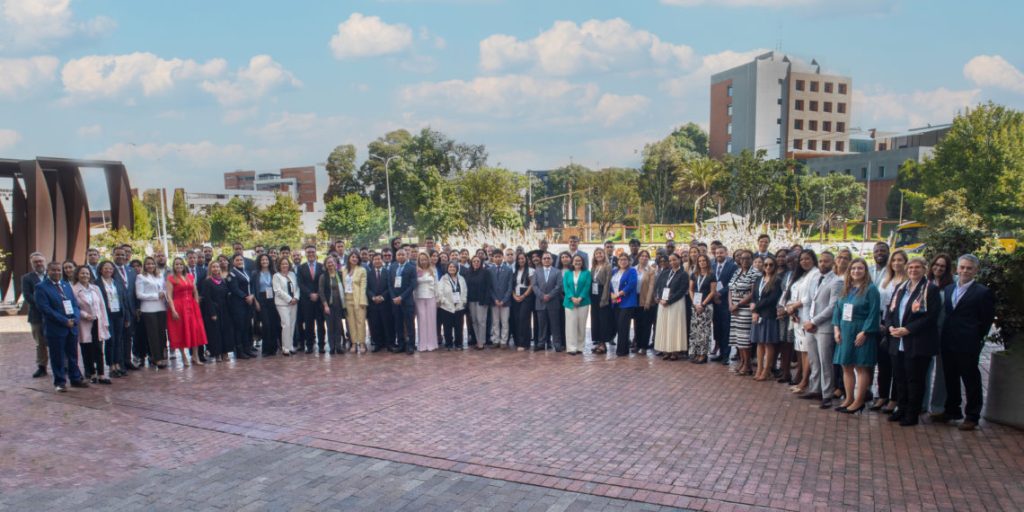Saint Kitts and Nevis Officials Participate in Regional Youth Protection Dialogue
The Youth Protection Seminar, held in Bogotá, Colombia from March 25-27, 2025, under the auspices of the European Union’s EL PAcCTO 2.0 Programme, served as a crucial platform for international collaboration on bolstering child and youth protection systems. The seminar drew together a diverse array of stakeholders, including policymakers, justice system professionals, and youth development experts from Latin America and the Caribbean. Their shared objective was to explore and exchange effective strategies for safeguarding vulnerable young people, particularly in the context of organized crime and social instability. The Government of Saint Kitts and Nevis, represented by Permanent Secretary (Ag) in the Ministry of Justice and Legal Affairs, Ms. Nerissa Williams, and Permanent Secretary in the Ministry of Social Development and Gender Affairs, Ms. Azilla N. Clarke, actively participated in the seminar, demonstrating the nation’s unwavering commitment to youth welfare.
The seminar’s agenda encompassed a broad spectrum of critical topics, including the disproportionate impact of organized crime on adolescent girls, the implementation of restorative justice and juvenile diversion programs, and the development of multi-tiered prevention strategies. The Saint Kitts and Nevis delegation found particular value in sessions focusing on restorative juvenile justice practices, community-based prevention models, and the role of public policy in fostering youth resilience. These sessions provided valuable insights into best practices and innovative approaches that could be adapted and implemented within their national context. The seminar underscored the importance of a holistic, multi-sectoral approach to addressing the complex challenges facing young people.
The participation of Saint Kitts and Nevis in the seminar reflects the nation’s dedication to advancing justice sector reform and implementing social development policies that are responsive to the unique needs of young people. This commitment aligns with the country’s adherence to international human rights obligations, including the Sustainable Development Goals 16 and 5, which emphasize peace, justice, strong institutions, and gender equality. The seminar provided a valuable opportunity to learn from regional experiences and strengthen collaborative efforts to protect children and youth. The exchange of knowledge and experiences facilitated by the seminar will contribute to the development of more effective and targeted interventions.
Permanent Secretary Williams emphasized the significance of the seminar as a platform for engaging with regional partners and exploring practical solutions to strengthen national justice responses to youth vulnerability. She highlighted the importance of a coordinated, rights-based approach across all relevant institutions to ensure effective and equitable outcomes for young people in contact with the law. The seminar reinforced the understanding that a collaborative approach is crucial for addressing the multifaceted challenges faced by vulnerable youth and building stronger protection systems.
Permanent Secretary Clarke underscored the cross-cutting relevance of the seminar’s themes to the work of the Ministry of Social Development and Gender Affairs. She noted that the insights gained reaffirm the importance of integrated policy development between the justice and social sectors. Collaboration at the national level is critical to ensuring that prevention, protection, and rehabilitation services effectively support young people and address their diverse needs. The seminar provided valuable guidance on how to strengthen inter-ministerial cooperation and develop more cohesive strategies for youth development and protection.
The Government of Saint Kitts and Nevis expressed its gratitude to the organizers of the seminar, including the European Union, the EL PAcCTO 2.0 Programme, and the Government of Colombia, for facilitating this timely exchange of knowledge and best practices. The lessons learned from the seminar will inform and enhance national efforts to promote social justice, expand the use of restorative mechanisms within the justice system, and mitigate the risks faced by children and youth in contact with the law. The seminar’s outcomes will contribute to the development of more comprehensive and effective strategies for protecting vulnerable young people and ensuring their well-being.
Share this content:












Post Comment